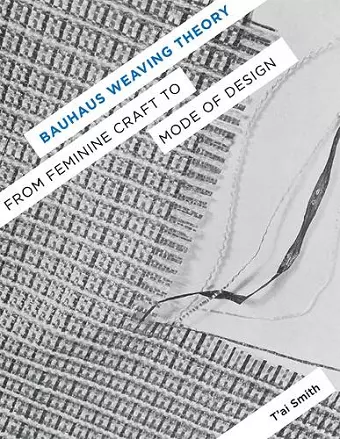Bauhaus Weaving Theory
From Feminine Craft to Mode of Design
Format:Paperback
Publisher:University of Minnesota Press
Published:9th Nov '14
Should be back in stock very soon

The Bauhaus school in Germany has long been understood through the writings of its founding director, Walter Gropius, and well-known artists who taught there such as Wassily Kandinsky and László Moholy-Nagy. Far less recognized are texts by women in the school’s weaving workshop. In Bauhaus Weaving Theory, T’ai Smith uncovers new significance in the work the Bauhaus weavers did as writers.
From colorful, expressionist tapestries to the invention of soundproofing and light-reflective fabric, the workshop’s innovative creations influenced a modernist theory of weaving. In the first careful examination of the writings of Bauhaus weavers, including Anni Albers, Gunta Stözl, and Otti Berger, Smith details how these women challenged assumptions about the feminine nature of their craft. As they harnessed the vocabulary of other disciplines like painting, architecture, and photography, Smith argues, the weavers resisted modernist thinking about distinct media. In parsing texts about tapestries and functional textiles, the vital role these women played in debates about medium in the twentieth century and a nuanced history of the Bauhaus comes to light.
Bauhaus Weaving Theory deftly reframes the Bauhaus weaving workshop as central to theoretical inquiry at the school. Putting questions of how value and legitimacy are established in the art world into dialogue with the limits of modernism, Smith confronts the belief that the crafts are manual and technical but never intellectual arts.
"T’ai Smith’s careful opening up of the theoretical space between ‘craft’ and ‘medium’ will be an important intervention into discussions of medium specificity in the arts of the twentieth century. Attuned to the historical specificity of the practice, gender roles, and new possibilities for mediation in the Weimar period, she gives a compelling account of how the practical and theoretical concerns of weaving were negotiated discursively as well." —Frederic J. Schwartz, University College London
"This is the first scholarly analysis of the theoretical writing by the women weavers of the Bauhaus and as such fills a huge gap in the literature about the work of women artists at the school and the role and evolution of a feminized craft within the institution’s history. This book functions as not only a history of the weaving workshop, but also a nuanced history of the Bauhaus through the lens of creative practice." —Elissa Auther, University of Colorado, Colorado Springs
"Smith’s account yields important insights for the history of modernism as well as the art world’s current fascination with textiles and fiber art. A welcome resource for any scholar of modernism and a crucial lens on contemporary textile art."—Art Papers
"This book of theoretical essays uncovers a rarely spotlighted yet deeply significant creative process within the Bauhaus movement."—Metropolis
"An edifying and overdue investigation of the weavers’ far-reaching contributions."—American Craft
"A fascinating book that should interest professionals and amateurs alike."—CHOICE
"Compelling research."—Crafts Magazine
"An important schoalarly work for anyone interested in the history of fiber art, weaving, and the discourse about art vs. medium-specific craft."—Shuttle Spindle & Dyepot
"Bauhaus Weaving Theory proves to be foundational in rethinking weaving; it is a remarkable work of scholarship, pellucid and engaging."—Journal of Modern Craft
ISBN: 9780816687244
Dimensions: 203mm x 152mm x 38mm
Weight: unknown
272 pages